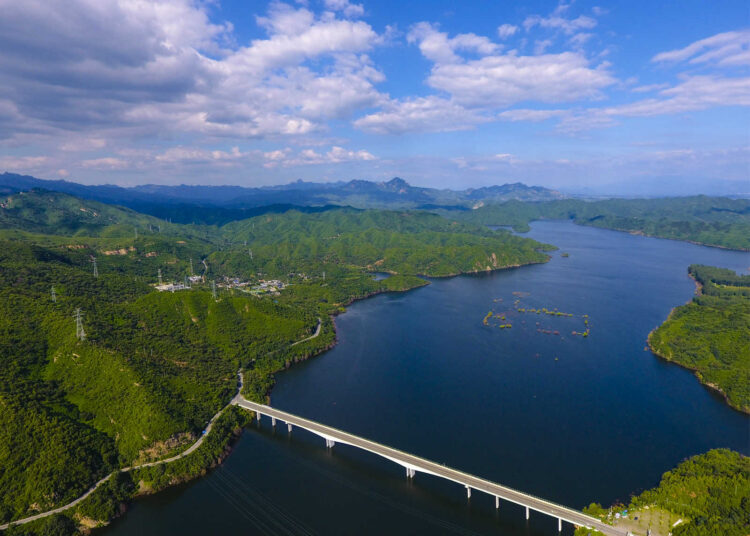By Zhu Jingruo, He Yong, People’s Daily Online
Beijing’s Miyun Reservoir had just celebrated its 60th anniversary recently. As an important source of drinking water for the Chinese capital, it hasnourished generations of people in the past six decades.
Thanks to the strict and science-based management of the reservoir, it is seeing increasingly improved water quality.
The areas with an elevation of less than 155 meters around the reservoir are listed as first-class protection zones, said Yang Rongliang, head of the waterborne unit of the comprehensive law enforcement team of the reservoir. According to him, these zones are enclosed by 2.5-meter-high fences that total 305 kilometers, and all irrelevant personnel are not allowed to enter them.
A total of 394 cameras are installed around the fences for 24-hour monitoring, which can sound alarms when spotting trespassing, persuade trespassers to leave and obtain evidences of trespassing. Besides, facial recognition and vehicle plate recognition are also adopted at each entrance of the protection zones to improve the efficiency of law enforcement.
In addition, all gas-fueled law enforcement vessels in the reservoir have been replaced by clean-energy ones. The comprehensive law enforcement team of the reservoir is also equipped with drones to crack down on illegal activities. So far, the team has busted three illegal electrofishing cases, and all six people involved were put into sentence.
The first-class protection zones of the reservoir, which cover 273 square kilometers, are divided into 160 water retention grids protected by 2,150 full-time personnel.
The reservoir also launched a water purifying campaign in upstream counties and districts, establishing a solid line of defense of ecological restoration, treatment and protection. It adopted 21 measures to treat water and soil loss in 600 square kilometers of land.
According to the water environment monitoring center of Miyun Reservoir’s management office, the frequency of monitoring has been increased to once a week, and the water quality in the reservoir is always maintained above the level II standard for ground water, which is higher than the standard for drinking water.
To better protect the environment, Miyun Reservoir introduced a comprehensive ban on husbandry, removing 692 livestock farms in the first-class protection zones, as well as 72 aquacultureenterprises along upstream rivers.
Rich in resources of iron mine, Miyun district, where the reservoir is located, is home to 98 percent of iron ores in Beijing. However, the reservoir resolutely closed 5 mining companies for water retention, even though they could create huge economic profits and job opportunities.
As of the end of last year, the forest coverage rate in Miyun district reached 65.55 percent, and the green coverage rate also hit 75.3 percent. The parkland per capita in urban areas was raised to 14.86 square meters, and the coverage of parks and green spaces within a 500-meter radius of residential areas was expanded to 81.96 percent in the district.
Liu Xiansheng is a villager in Xikouwai village, Fengjiayu township of Miyun district. A total of 85.6 percent of land is covered by forests in the township, but the strict water retention measures are keeping villagers away from using local water and forest resources.
To solve the development problem of the villagers, the district government sent Liu 50 swarms of bees and a whole set of apiculture facilities in 2017. It also dispatched technicians to guide the man keep the bees.
Now, Liu owns 150 beehives and makes over 60,000 yuan ($8,770) per year. “I’m planning to add another 50 beehives,” he told the People’s Daily.
Apiculture is currently a major industry for Miyun. At present, the district is home to 2,072 beekeepers and 115,000 swarms.
Thanks to the sound ecological environment, Miyun district has embraced prosperous development of eco-agriculture, folk tourism and characteristic economy. Its tourist revenue has ranked first among all ecological conservation areas in Beijing for 9 years in a row.












